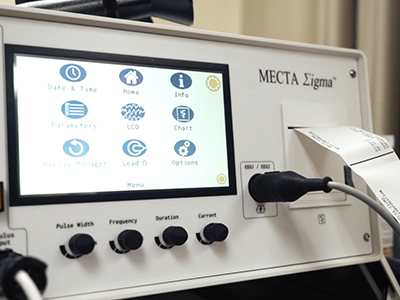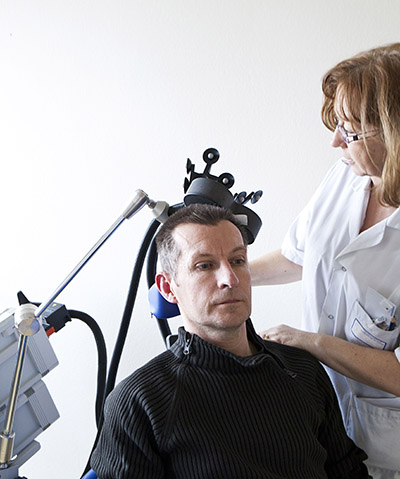Electroconvulsive Therapy (ECT)
Some individuals struggling with mental health issues are unable to find effective therapeutic options. In cases where medications or therapy do not produce desired results, Electroconvulsive Therapy (ECT) may be an appropriate treatment option. At SABHH we use Electroconvulsive Therapy for depression, bipolar disorder, schizophrenia and other mental health disorders.
What is ECT?
ECT is an elective procedure most commonly used to treat severe depression. It can also treat symptoms of bipolar disorder, schizophrenia and other mental illnesses. Electroconvulsive therapy can provide relief for patients who haven’t improved with medications, psychotherapy, or other forms of treatment.
During ECT treatments a brief electrical stimulus is passed across the brain, which in turn induces a mild seizure that facilitates chemical changes in the brain. These changes can improve brain function and provide quick relief. There is also evidence that suggests ECT stimulates new brain cell growth and development.
ECT is considered a fast and highly effective treatment for severe depression and other psychiatric disorders. It can help patients improve their mental health to return to a healthy, productive life. ECT is a low-risk, lifesaving treatment that produces few to no long-term side effects.
Treatments are performed in a controlled environment under the direct supervision of a psychiatrist and anesthesiologist. Many patients experience symptom reliefs in as few as five ECT treatments.
How ECT Treatments are Performed
Once cleared for ECT Treatment, the patient will be escorted to the treatment room and prepared for ECT. This will include:
- A nurse placing an IV in your arm
- An assessment by the nurse and doctors
- Vital signs being taken
- An oxygen mask placed over your nose and mouth
- Electrodes placed on your head and chest
 Once ready for treatment, the patient will be given anesthesia and a muscle relaxant by the anesthesiologist. This will cause the patient to fall asleep until after the ECT treatment has been performed. Patients are completely asleep during treatment and do not have any memory of the procedure.
Once ready for treatment, the patient will be given anesthesia and a muscle relaxant by the anesthesiologist. This will cause the patient to fall asleep until after the ECT treatment has been performed. Patients are completely asleep during treatment and do not have any memory of the procedure.
The treatment is delivered by a trained psychiatrist using the ECT machine. This machine delivers a brief electrical stimulus across the brain that induces a mild seizure that lasts about 45 – 60 seconds. Throughout the procedure, the patient is continuously monitored by a team of professionals. Once the patient wakes up (5-10 minutes after the procedure), they are escorted to the recovery room. Once fully awake, alert, and ready to leave, the patient will be discharged home.
What Type of Patient Can Benefit From ECT?
It is important to note that, while ECT is often effective, the treatment is not for everyone. Mental health providers only prescribe ECT after patients have exhausted all other treatment options. Generally, providers only administer ECT to patients who suffer from depression, bipolar disorder and severe cases of schizophrenia where the patient is unresponsive to medications. At SABHH, our medical professionals can help each patient and the patient’s primary care provider determine if ECT is the best treatment option.
Key Benefits of ECT
ECT provides rapid treatment of symptoms without the use of prescription medications. Clinicians do not have to worry about potential drug interactions with medications patients may already be taking.
ECT is covered by most insurance providers, which is an important factor to consider. Many patients are unable to afford complicated treatment and medication regimens and may find ECT to be a more affordable option. For many individuals ECT may be the best treatment option that can help them return to a normal and productive life.
Interested in ECT services?
To learn more or determine if ECT is right for you, a loved one, or friend, please contact us at 210-592-7372 or 210-541-5350.
Transcranial Magnetic Stimulation (TMS)
 SABHH offers Transcranial Magnetic Stimulation (TMS) treatments for adults ages 18 and older who suffer from severe depression. TMS is an outpatient procedure ideal for patients where medication is no longer as effective. TMS therapy is a proven, effective treatment alternative for those who fall within the treatment-resistant category.
SABHH offers Transcranial Magnetic Stimulation (TMS) treatments for adults ages 18 and older who suffer from severe depression. TMS is an outpatient procedure ideal for patients where medication is no longer as effective. TMS therapy is a proven, effective treatment alternative for those who fall within the treatment-resistant category.
What is Transcranial Magnetic Stimulation?
Transcranial Magnetic Stimulation (TMS) therapy stimulates nerve cells by delivering a series of painless electromagnetic pulses to specific regions of the brain that are associated with depression and mood changes. Depressed patients are shown to have reduced electrical activity in certain areas of the brain and TMS directly focuses on those areas,
It’s a non-invasive outpatient procedure performed at SABHH by a medical doctor and technician specialized in TMS treatment. You will meet with a psychiatrist to determine if you are a candidate for TMS and a brain mapping will be completed prior to beginning treatment.
What can I Expect During a TMS Treatment?
After your initial meeting with the psychiatrist and a treatment plan is created, the treatments will begin. A magnetic coil is placed on designated areas of your head. You will be awake throughout the duration of the 45-minute treatment and may feel a slight tingling from the coil. After treatment is complete, you will be able to drive yourself home and resume your normal daily activities.
TMS treatments are generally administered 5 days per week over a 6-week period. It is a safe procedure showing very mild to moderate, short-term side effects, including scalp discomfort and mild headaches.
Am I a Candidate for TMS Treatment?
Patients who have been diagnosed with depression and have failed to achieve satisfactory improvement from psychotropic medications are ideal candidates for TMS. It is not appropriate for all patients and a thorough screening will be provided by San Antonio Behavioral Healthcare Hospital clinical staff to determine if TMS is suitable.
We’re here 24/7; help is only 1 call away.
Call or come in today for a free, confidential assessment.
TMS is not recommended for people with the following metal or implanted medical devices:
- Stents
- Aneurysm Clips or Coils
- Implanted Vagus Nerve or Deep Brain Stimulators
- Electrodes for Monitoring Brain Activity
- Cochlear Implants for Hearing
- Implanted Stimulators
- Magnetic Implants
- Bullet Fragments
- Implanted Electrical Devices Including Medication Pumps and Pacemakers
TMS is offered as an outpatient procedure and is covered by some insurances as well as case payment options are offered.
Are you interested in TMS services? You will need to complete a referrals packet and submit it to our Outpatient Department to determine if you qualify. Please reach out today and ask to speak with Outpatient about TMS, at 210-541-5289.

 Once ready for treatment, the patient will be given anesthesia and a muscle relaxant by the anesthesiologist. This will cause the patient to fall asleep until after the ECT treatment has been performed. Patients are completely asleep during treatment and do not have any memory of the procedure.
Once ready for treatment, the patient will be given anesthesia and a muscle relaxant by the anesthesiologist. This will cause the patient to fall asleep until after the ECT treatment has been performed. Patients are completely asleep during treatment and do not have any memory of the procedure. SABHH offers Transcranial Magnetic Stimulation (TMS) treatments for adults ages 18 and older who suffer from severe depression. TMS is an outpatient procedure ideal for patients where medication is no longer as effective. TMS therapy is a proven, effective treatment alternative for those who fall within the treatment-resistant category.
SABHH offers Transcranial Magnetic Stimulation (TMS) treatments for adults ages 18 and older who suffer from severe depression. TMS is an outpatient procedure ideal for patients where medication is no longer as effective. TMS therapy is a proven, effective treatment alternative for those who fall within the treatment-resistant category.



